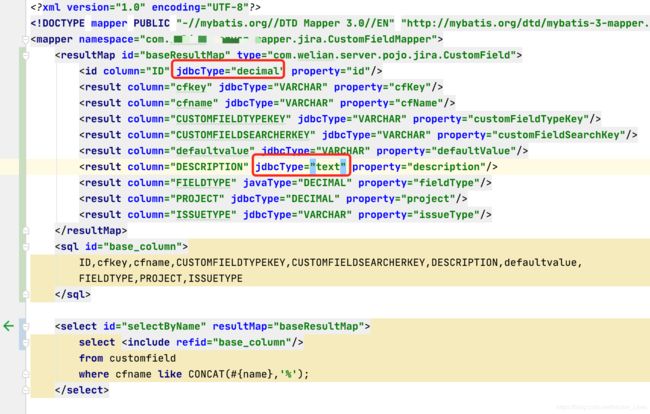No enum constant org.apache.ibatis.type.JdbcType.*
异常记录:mybatis .xml解析异常
CREATE TABLE `customfield` (
`ID` decimal(18,0) NOT NULL,
`cfkey` varchar(255) DEFAULT NULL,
`CUSTOMFIELDTYPEKEY` varchar(255) DEFAULT NULL,
`CUSTOMFIELDSEARCHERKEY` varchar(255) DEFAULT NULL,
`cfname` varchar(255) DEFAULT NULL,
`DESCRIPTION` text,
`defaultvalue` varchar(255) DEFAULT NULL,
`FIELDTYPE` decimal(18,0) DEFAULT NULL,
`PROJECT` decimal(18,0) DEFAULT NULL,
`ISSUETYPE` varchar(255) DEFAULT NULL,
PRIMARY KEY (`ID`)
) ENGINE=InnoDB DEFAULT CHARSET=utf8mb4;
解决办法:
- xml文件中的jdbcType严格对应下面的枚举类型即可
- 比如大小写问题,比如枚举中并不存在text类型
/*
* Copyright (c) 2013, Oracle and/or its affiliates. All rights reserved.
* ORACLE PROPRIETARY/CONFIDENTIAL. Use is subject to license terms.
*/
package java.sql;
/**
* Defines the constants that are used to identify generic
* SQL types, called JDBC types.
*
* @see SQLType
* @since 1.8
*/
public enum JDBCType implements SQLType {
/**
* Identifies the generic SQL type {@code BIT}.
*/
BIT(Types.BIT),
/**
* Identifies the generic SQL type {@code TINYINT}.
*/
TINYINT(Types.TINYINT),
/**
* Identifies the generic SQL type {@code SMALLINT}.
*/
SMALLINT(Types.SMALLINT),
/**
* Identifies the generic SQL type {@code INTEGER}.
*/
INTEGER(Types.INTEGER),
/**
* Identifies the generic SQL type {@code BIGINT}.
*/
BIGINT(Types.BIGINT),
/**
* Identifies the generic SQL type {@code FLOAT}.
*/
FLOAT(Types.FLOAT),
/**
* Identifies the generic SQL type {@code REAL}.
*/
REAL(Types.REAL),
/**
* Identifies the generic SQL type {@code DOUBLE}.
*/
DOUBLE(Types.DOUBLE),
/**
* Identifies the generic SQL type {@code NUMERIC}.
*/
NUMERIC(Types.NUMERIC),
/**
* Identifies the generic SQL type {@code DECIMAL}.
*/
DECIMAL(Types.DECIMAL),
/**
* Identifies the generic SQL type {@code CHAR}.
*/
CHAR(Types.CHAR),
/**
* Identifies the generic SQL type {@code VARCHAR}.
*/
VARCHAR(Types.VARCHAR),
/**
* Identifies the generic SQL type {@code LONGVARCHAR}.
*/
LONGVARCHAR(Types.LONGVARCHAR),
/**
* Identifies the generic SQL type {@code DATE}.
*/
DATE(Types.DATE),
/**
* Identifies the generic SQL type {@code TIME}.
*/
TIME(Types.TIME),
/**
* Identifies the generic SQL type {@code TIMESTAMP}.
*/
TIMESTAMP(Types.TIMESTAMP),
/**
* Identifies the generic SQL type {@code BINARY}.
*/
BINARY(Types.BINARY),
/**
* Identifies the generic SQL type {@code VARBINARY}.
*/
VARBINARY(Types.VARBINARY),
/**
* Identifies the generic SQL type {@code LONGVARBINARY}.
*/
LONGVARBINARY(Types.LONGVARBINARY),
/**
* Identifies the generic SQL value {@code NULL}.
*/
NULL(Types.NULL),
/**
* Indicates that the SQL type
* is database-specific and gets mapped to a Java object that can be
* accessed via the methods getObject and setObject.
*/
OTHER(Types.OTHER),
/**
* Indicates that the SQL type
* is database-specific and gets mapped to a Java object that can be
* accessed via the methods getObject and setObject.
*/
JAVA_OBJECT(Types.JAVA_OBJECT),
/**
* Identifies the generic SQL type {@code DISTINCT}.
*/
DISTINCT(Types.DISTINCT),
/**
* Identifies the generic SQL type {@code STRUCT}.
*/
STRUCT(Types.STRUCT),
/**
* Identifies the generic SQL type {@code ARRAY}.
*/
ARRAY(Types.ARRAY),
/**
* Identifies the generic SQL type {@code BLOB}.
*/
BLOB(Types.BLOB),
/**
* Identifies the generic SQL type {@code CLOB}.
*/
CLOB(Types.CLOB),
/**
* Identifies the generic SQL type {@code REF}.
*/
REF(Types.REF),
/**
* Identifies the generic SQL type {@code DATALINK}.
*/
DATALINK(Types.DATALINK),
/**
* Identifies the generic SQL type {@code BOOLEAN}.
*/
BOOLEAN(Types.BOOLEAN),
/* JDBC 4.0 Types */
/**
* Identifies the SQL type {@code ROWID}.
*/
ROWID(Types.ROWID),
/**
* Identifies the generic SQL type {@code NCHAR}.
*/
NCHAR(Types.NCHAR),
/**
* Identifies the generic SQL type {@code NVARCHAR}.
*/
NVARCHAR(Types.NVARCHAR),
/**
* Identifies the generic SQL type {@code LONGNVARCHAR}.
*/
LONGNVARCHAR(Types.LONGNVARCHAR),
/**
* Identifies the generic SQL type {@code NCLOB}.
*/
NCLOB(Types.NCLOB),
/**
* Identifies the generic SQL type {@code SQLXML}.
*/
SQLXML(Types.SQLXML),
/* JDBC 4.2 Types */
/**
* Identifies the generic SQL type {@code REF_CURSOR}.
*/
REF_CURSOR(Types.REF_CURSOR),
/**
* Identifies the generic SQL type {@code TIME_WITH_TIMEZONE}.
*/
TIME_WITH_TIMEZONE(Types.TIME_WITH_TIMEZONE),
/**
* Identifies the generic SQL type {@code TIMESTAMP_WITH_TIMEZONE}.
*/
TIMESTAMP_WITH_TIMEZONE(Types.TIMESTAMP_WITH_TIMEZONE);
/**
* The Integer value for the JDBCType. It maps to a value in
* {@code Types.java}
*/
private Integer type;
/**
* Constructor to specify the data type value from {@code Types) for
* this data type.
* @param type The value from {@code Types) for this data type
*/
JDBCType(final Integer type) {
this.type = type;
}
/**
*{@inheritDoc }
* @return The name of this {@code SQLType}.
*/
public String getName() {
return name();
}
/**
* Returns the name of the vendor that supports this data type.
* @return The name of the vendor for this data type which is
* {@literal java.sql} for JDBCType.
*/
public String getVendor() {
return "java.sql";
}
/**
* Returns the vendor specific type number for the data type.
* @return An Integer representing the data type. For {@code JDBCType},
* the value will be the same value as in {@code Types} for the data type.
*/
public Integer getVendorTypeNumber() {
return type;
}
/**
* Returns the {@code JDBCType} that corresponds to the specified
* {@code Types} value
* @param type {@code Types} value
* @return The {@code JDBCType} constant
* @throws IllegalArgumentException if this enum type has no constant with
* the specified {@code Types} value
* @see Types
*/
public static JDBCType valueOf(int type) {
for( JDBCType sqlType : JDBCType.class.getEnumConstants()) {
if(type == sqlType.type)
return sqlType;
}
throw new IllegalArgumentException("Type:" + type + " is not a valid "
+ "Types.java value.");
}
}
